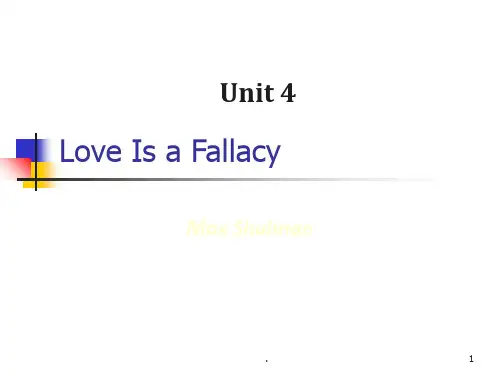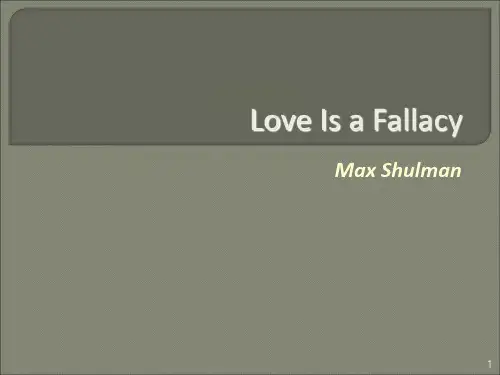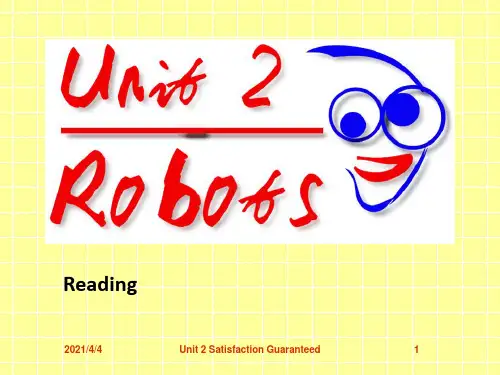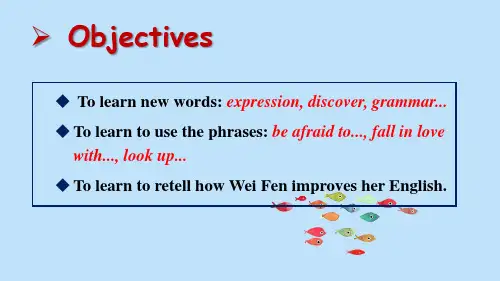英语pptFall In Love With A City
- 格式:ppt
- 大小:4.09 MB
- 文档页数:16



fall in love with用法详解Fall in love with这个短语在日常英语交流中十分常见,但很多人都不知道它的详细用法。
今天,我们就来一步步地了解一下。
首先,fall in love with意为“爱上,坠入爱河”,指一个人不经意地爱上了另一个人、物品或活动。
例如:- I fell in love with him the first time I saw him.(我一见到他就爱上了他。
)- She fell in love with the city as soon as she arrived.(她一到这个城市就爱上了它。
)- He fell in love with hiking after his first trip.(他第一次旅行后就对徒步旅行着迷了。
)其次,介词with在其中起到了重要的作用。
它表示“和……在一起”,说明主语坠入爱河的对象是谁。
例如:- I fell in love with him.(我爱上了他。
)- She fell in love with the city.(她爱上了这个城市。
)- He fell in love with hiking.(他爱上了徒步旅行。
)注意,with常常和fall in love连用,但并不是必须的。
例如:- They have been dating for a year and I think they are falling in love.(他们交往了一年,我觉得他们正在陷入爱河。
)再次,fall in love with也可用于表示“爱上某种活动”。
例如:- I fell in love with cooking when I was in college.(我大学时爱上了烹饪。
)- My sister fell in love with painting last year.(我姐姐去年爱上了画画。
)也可以说用于强调一个行动的重要性。



Fall in Love with AnyoneMore than 20 years ago, the psychologist Arthur Aron succeeded in making two strangers fall in love in his laboratory. Last summer, I applied his technique in my own life, which is how I found myself standing on a bridge at midnigh t, staring into a man’s eyes for exactly four minutes.Let me explain. Earlier in the evening, that man had said: “I suspect, given a few commonalities, you could fall in love with anyone. If so, how do you choose someone?”He was a university acquaintance I occasionally ran into at the climbing gym and had thought, “What if?” I had gotten a glimpse into his days on Instagram. But this was the first time we had hung out one-on-one.“Actually, psychologists have tried making people fall in love,” I said, rem embering Dr. Aron’s study. “It’s fascinating. I’ve always wanted to try it.”I first read about the study when I was in the midst of a breakup. Each time I thought of leaving, my heart overruled my brain. I felt stuck. So, like a good academic, I turned to science, hoping there was a way to love smarter.I explained the study to my university acquaintance. A heterosexual man and woman enter the lab through separate doors. They sit face to face and answer a series of increasingly personal questions. Then they stare silently into each other’s eyes for four minutes. The most tantalizing detail: Six months later, two participants were married. They invited the entire lab to the ceremony.“Let’s try it,” he said.Let me acknowledge the ways our experiment already fails to line up with the study. First, we were in a bar, not a lab. Second, we weren’t strangers. Not only that, but I see now that one neither suggests nor agrees to try an experiment designed to create romantic love if one isn’t open to this happening.I Googled Dr. Aron’s questions; there are 36. We spent the next two hours passing my iPhone across the table, alternately posing each question.They began innocuously: “Would you like to be famous? In what way?” And “When did you last sing to yourself? To someone else?”But they quickly became probing.In response to the prompt, “Name three things you and your partner appear to have in common,” he looked at me and said, “I think we’re both interested in each other.”I grinned and gulped my beer as he listed two more commonalities I then promptly forgot. We exchanged stories about the last time we each cried, and confessed the one thing we’d like to ask a fortuneteller. We explained our relationships with our mothers.The questions reminded me of the infamous boiling frog experiment in which the frog doesn’t feel the water getting hotter until it’s too late. With us, because the level of vulnerability increased gradually, I didn’t notice we had entered intimate territory until we were already there, a process that can typically take weeks or months.I liked learning about myself through my answers, but I liked learning things about him even more. The bar, which was empty when we arrived, had filled up by the time we paused for a bathroom break.I sat alone at our table, aware of my surroundings for the first time in an hour, and wondered if anyone had been listening to our conversation. If they had, I hadn’t noticed. And I didn’t notice as the crowd thinned and the night got late.We all have a narrative of ourselves that we offer up to strangers and acquaintances, but Dr. Aron’s questions make it impossible to rely on that narrative. Ours was the kind of accelerated intimacy I remembered from summer camp, staying up all night with a new friend, exchanging the details of our short lives. At 13, away from home for the first time, it felt natural to get to know someone quickly. But rarely does adult life present us with such circumstances.The moments I found most uncomfortable were not when I had to make confessions about myself, but had to venture opinions about my partner. For example: “Alternate sharing something you consider a positive characteristic of your partner, a total of five items” (Question 22), and “Tell your partner what you like about them; be very honest this time saying things you might not say to someone you’ve just met” (Question 28).Much of Dr. Aron’s research focuses on creating interpersonal closeness. In particular, several studies investigate the ways we incorporate others into our sense of self. It’s easy to see how the questions encourage whatthey call “self-expansion.” Saying things like, “I like your voice, your taste in beer, the way all your friends seem to admire you,” makes certain positive qualities belonging to one person explicitly valuable to the other.It’s astounding, really, to hear what someone admires in you. I don’t know why we don’t go around thoughtfully complimenting one another all the time.We finished at midnight, taking far longer than the 90 minutes for the original study. Looking around the bar, I felt as if I had just woken up. “That wasn’t so bad,” I said. “Definitely less uncomfortable than the staring into each other’s eyes part would be.”He hesitated and asked. “Do you think we should do that, too?”“Here?” I looked around the bar. It seemed too weird, too public.“We could stand on the bridge,” he said, turning toward the window.The night was warm and I was wide-awake. We walked to the highest point, then turned to face each other. I fumbled with my phone as I set the timer.“O.K.,” I said, inhaling sharply.“O.K.,” he said, smiling.I’ve skied steep slopes and hung from a rock face by a short length of rope, but staring into someone’s eyes for four silent minutes was one of the more thrilling and terrifying experiences of my life. I spent the first couple of minutes just trying to breathe properly. There was a lot of nervous smiling until, eventually, we settled in.I know the eyes are the windows to the soul or whatever, but the real crux of the moment was not just that I was really seeing someone, but that I was seeing someone really seeing me. Once I embraced the terror of this realization and gave it time to subside, I arrived somewhere unexpected.I felt brave, and in a state of wonder. Part of that wonder was at my own vulnerability and part was the weird kind of wonder you get from saying a word over and over until it loses its meaning and becomes what it actually is: an assemblage of sounds.So it was with the eye, which is not a window to anything but a rather clump of very useful cells. The sentiment associated with the eye fellaway and I was struck by its astounding biological reality: the spherical nature of the eyeball, the visible musculature of the iris and the smooth wet glass of the cornea. It was strange and exquisite.When the timer buzzed, I was surprised — and a little relieved. But I also felt a sense of loss. Already I was beginning to see our evening through the surreal and unreliable lens of retrospect.Most of us think about love as something that happens to us. We fall. We get crushed.But what I like about this study is how it assumes that love is an action. It assumes that what matters to my partner matters to me because we have at least three things in common, because we have close relationships with our mothers, and because he let me look at him.I wondered what would come of our interaction. If nothing else, I thought it would make a good story. But I see now that the story isn’t about us; it’s about what it means to bother to know s omeone, which is really a story about what it means to be known.It’s true you can’t choose who loves you, although I’ve spent years hoping otherwise, and you can’t create romantic feelings based on convenience alone. Science tells us biology matters; our pheromones and hormones do a lot of work behind the scenes.But despite all this, I’ve begun to think love is a more pliable thing than we make it out to be. Arthur Aron’s study taught me that it’s possible —simple, even —to generate trust and intimacy, the feelings love needs to thrive.You’re probably wondering if he and I fell in love. Well, we did. Although it’s hard to credit the study entirely (it may have happened anyway), the study did give us a way into a relationship that feels deliberate. We spent weeks in the intimate space we created that night, waiting to see what it could become.Love didn’t happen to us. We’re in love because we each made the choice to be.The 36 questions were published in a studyby psychologist Arthur Aron called ‘The Experimental Generation of Interpersonal Closeness’.He tested the theory that it’s possib le to make two people fall in love bygetting them to share intimate thoughts and memories. To prove this, he persuaded 52 sets of male and female strangers and 19 sets of female strangers to try it. Two of the participants entered a lab via separate doors, before sitting opposite one another and answering his series of ever-more personal and probing questions.Six months after the experiment? Two of them got married (and they invited thewhole lab to the ceremony).The 36 questions which can make you ‘fall in love with anyone’:Set One1. Given the choice of anyone in the world, whom would you want as a dinner guest?2. Would you like to be famous? In what way?3. Before making a telephone call, do you ever rehearse what you are going tosay? Why?4. What would constitute a “perfect” day for you?5. When did you last sing to yourself? To someone else?6. If you were able to live to the age of 90 and retain either the mind orbody of a 30-year-old for the last 60 years of your life, which would you want?7. Do you have a secret hunch about how you will die?8. Name three things you and your partner appear to have in common.9. For what in your life do you feel most grateful?10. If you could change anything about the way you were raised, what would itbe?11. Take four minutes and tell your partner your life story in as much detailas possible.12. If you could wake up tomorrow having gained any one quality or ability, what would it be?Set Two13. If a crystal ball could tell you the truth about yourself, your life, thefuture or anything else, what would you want to know?14. Is there something that you’ve dreamed of doing for a long time? Why haven’t you done it?15. What is the greatest accomplishment of your life?16. What do you value most in a friendship?17. What is your most treasured memory?18. What is your most terrible memory?19. If you knew that in one year you would die suddenly, would you change anything about the way you are now living? Why?20. What does friendship mean to you?21. What roles do love and affection play in your life?22. Alternate sharing something you consider a positive characteristic of yourpartner. Share a total of five items.23. How close and warm is your family? Do you feel your childhood was happierthan most other people’s?24. How do you feel about your relationship with your mother?Set Three25. Make three true “we” statements each. For instance, “We are both in thisroom feeling … “26. Complete this sentence: “I wish I had someone with whom I could share … “27. If you were going to become a close friend with your partner, please sharewhat would be important for him or her to know.28. Tell your partner what you like about them; be very honest this time, saying things that you might not say to someone you’ve just met.29. Share with your partner an embarrassing moment in your life.30. When did you last cry in front of another person? By yourself?31. Tell your partner something that you like about them already.32. What, if anything, is too serious to be joked about?33. If you were to die this evening with no opportunity to communicate withanyone, what would you most regret not having told someone? Why haven’t youtold them yet?34. Your house, containing everything you own, catches fire. After saving yourloved ones and pets, you have time to safely make a final dash to save anyone item. What would it be? Why?35. Of all the people in your family, whose death would you find most disturbing? Why?36. Share a personal problem and ask your partner’s advice on how he or shemight handle it. Also, ask your partner to reflect back to you how you seemto be feeling about the problem you have chosen.。





fall in love中文是什么意思•中文翻译•爱上,相爱•爱上某人•爱上他•滴滴•谈恋爱•陷入爱河•陷入爱情•陷入情网,爱上•相爱,爱上•与...恋爱.爱上•追爱总动员•坠入爱河•坠入情网•fall vi. (fell; fallen ) 1.落下;散落,...•love n. 1.爱,热爱,爱戴。
give [send] on ...•fall in love with 爱上(某人或某物); 开始爱上; 喜爱;爱上; 相爱,爱上; 与……相爱•fall in love with it 爱上它•love in fall 爱在深秋•don’t fall in love with dream 别在梦里爱我•fall in love again 重机关报爱过; 重新爱过•fall in love at first sight 相信一见钟情; 一见钟情•fall in love at kiss 一吻倾情•fall in love at the first sight 一见钟情•fall in love on the internet 网络恋情•fall in love with diamond 钻石迷情•fall in love with sb 坠入爱河•fall in love with someone 来电•fall in love with you 和自己恋爱•fall out of love 爱情中断; 失恋•if i could fall in love 假如我堕入爱河(蓝尼克罗维兹); 如果能坠入爱河•if we fall in love again 如果我们相爱再次•it happens everywhere to fall in love 恋爱是随地的•just to fall in love 就这样坠入爱河; 能沉浸在爱情中•kiss and fall in love with you 吻下去爱上你•only fools fall in love 阿呆拜寿; 呆佬拜寿•to fall in love again 再陷情海•when i fall in love 当你坠入爱河; 当我爱上你; 当我堕入爱河(西雅图夜末眠); 当我坠入爱河《西亚图夜未明》主题曲; 当我坠入情网; 身陷情网; 我们相爱的时候; 西雅图夜未眠; 坠入情网•when you fall in love 当你恋爱时•例句与用法1.He has fallen in love with the actress .他已经爱上了这个女演员。
fall in live withFall in Love WithIntroductionLove is a complex and beautiful emotion that has captivated countless individuals throughout history. The feeling of falling in love is like no other, as it can bring immense joy, happiness, and a sense of fulfillment. In this document, we will explore the various aspects of falling in love, including its stages, the signs of being in love, and the impact it has on our lives.Section 1: The Stages of Falling in Love1.1 The Infatuation StageThe journey of falling in love often begins with infatuation. During this stage, individuals experience intense attraction and often put their beloved on a pedestal. It is characterized by feelings of euphoria, excitement, and a constant preoccupation with the person of interest.1.2 Building a ConnectionAs the initial infatuation fades, a deeper connection starts to develop. This stage involves getting to know the other person on a more intimate level, sharing personal stories, and exploring common interests. Building a connection is essential for the foundation of a long-lasting and meaningful relationship.1.3 Emotional VulnerabilityFalling in love requires being emotionally vulnerable with another person. This stage involves letting down one's guard, trusting the other person, and revealing one's true self. It can be both exhilarating and terrifying, as it involves taking a leap of faith and opening up to the possibility of getting hurt.Section 2: Signs of Being in Love2.1 Butterflies in the StomachOne of the most common signs of being in love is experiencing \。
fall in love with用法详解《Fallinlovewith》是一个常见的英语短语,意为“爱上某人或某事物”。
这个短语在日常生活中非常常见,同时也是学习英语的初学者必须掌握的基本用语之一。
在本文中,我们将详细介绍《fall in love with》的用法,以帮助读者更好地理解和掌握这个短语。
一、基本用法《Fall in love with》的基本用法是指爱上某人或某事物。
例如:- I fell in love with her at first sight.(我一见钟情她。
) - He fell in love with music when he was young.(他年轻时就爱上了音乐。
)在这些句子中,我们可以看到,《fall in love with》经常用来描述人们对某个人或某个事物的热爱,通常是一个突然的、强烈的感觉。
二、扩展用法除了基本用法之外,《fall in love with》还有一些扩展用法,下面我们将逐一介绍。
1. Fall in love with oneself《Fall in love with oneself》是指爱上自己,通常用于形容某个人自信、自爱的状态。
例如:- She fell in love with herself after losing weight.(她减肥后变得更自信了。
)- He fell in love with himself when he finally achieved his goals.(他实现了自己的目标后更加自信了。
)2. Fall in love with a place《Fall in love with a place》是指爱上一个地方,通常用于形容某个人对某个城市或国家的热爱。
例如:- She fell in love with Paris when she first visited it.(她第一次去巴黎时就爱上了这个城市。
Falling in LovePaul White is the owner of the wood factory. He does not only run a successful business, but is also upright and willing to help the poor; therefore, everyone in the town is in awe of him. Mr. White appreciated J ames’ diligence and promoted him to be the manager, and even gave him carte blanche in dealing with business.The other day, James was invited to the W hite’s for dinner. James knocked on the door with a little nervousness, and then came an endearing girl opening the door.“Please come in. I am Lily White. You must be James, n ice to meet you.” She smiled a warm welcome, and it set him at ease immediately.After gazing at her for a little while, “oh…, yeah…, me too”, his slow reaction and ineloquence amused her.Following lily, James entered the living room.“May I…?” She pointed at the tribute he brought.“O h, yeah, of course, thank you.” He handed it to her and stared at her back until she disappeared.“You came, J ames,” Mr. W hite nodded at him, “we are talking about the acquisition of Tom C arpenters’ W orkshop. How do you like?”“W ell, let’s go to the heart of the matter. First of all, it will be none the worse for the workers there, because we will pay them higher salary while put lighter labor load on them. The most important is their workshop will gain tremendous momentum from our advanced machine system.” What single James out is not merely eloquence, but also his profound thought.“Bravo, J ames.” Mr. White applauded.Ms. White entered, “Dinner is ready.” She elaborated a table of various delicious dishes.Some guest remarked, “A good wife helps the man be remote from the turmoil of everyday life.”“T hat’s true,” Mr. W hite said, “James, you must have seen Lily, my daughter. What do you think?”“E n…, well…, she…, she’s very…very…lovely.” All of a sudden, his face flushed.To be continued…。